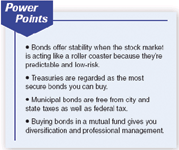Article
Investment Basics: Why you need bonds
Author(s):
Their predictability offers a needed balance to stock market volatility.
Now that you own mutual funds and stocks, is your portfolio complete? Not if you don't own debt. Yes, debt. If you really want diversification, consider holding at least a small number of high-quality bonds. True, bonds aren't exciting, but that isn't their appeal. Says financial planner Ron Rogé, "Bonds were specifically designed to be a low-risk, low-return investment."
"With bonds, you're not trying to beat the market, you're trying to preserve capital-to hold onto what you have with a limited amount of risk," adds financial planner David K. Sebastian. This stability can be very soothing when the stock market is acting like a roller coaster.
Below, we'll help you understand bonds, and look at the best ways to own them.

These two factors heavily influence the interest rate you'll be offered as an inducement to part with your cash. A shaky company's bonds typically offer a higher yield than a more established corporation's, since the latter is less likely to default on its obligations. But even so, a large corporation like GM has seen its credit rating drop in the past year, so size isn't always a guarantee.
And, generally, a five-year bond will yield more than a one-year bond to compensate for locking in your cash, making it unavailable to reinvest if interest rates rise. But here, too, there are no guarantees. Currently there's a flat yield curve for bonds. That means that bonds with 30-year maturities aren't paying significantly more than bonds that mature in six months or one year.
In addition to credit risk, bonds are also subject to interest-rate risk. If you need to sell one before its maturity date, and interest rates are higher than when you bought it, the bond's value will be lower, since bond prices move in the opposite direction from interest rates. For example, if you paid $10,000 for a 30-year US government bond that pays 5.04 percent annual interest, and the interest rate on government bonds jumps to 6 percent, no one will give you $10,000 for your bond when they can get a similar bond with greater yield. On the other hand, if the rate drops to 3 percent, that 5.04 percent bond will be worth more than the $10,000 you paid.
If you hold the bond until maturity, interest-rate changes won't affect its redemption. You'll get back the same amount you invested. But, you haven't avoided interest-rate risk. Say rates rise after you buy a 6 percent bond. Even though new bonds pay more, you'll still be earning 6 percent, so you'll lose potential income during the time you hold the bond.





